Web development is an integral part of this digital age. It offers an array of professional opportunities to aspirants with the right skill set and knowledge.
Making a career in web development means a chance for lifelong learning and constant growth. You’ll also stay updated with cutting-edge technologies and be assured of secure jobs.
From creating websites and applications to engaging users and making their lives convenient, web development gives you some of the most amazing moments throughout your professional journey.
Anyone who is planning to make a career in the web development industry can explore a myriad of paths. Whether your specialization is designing, assessing security flaws, or writing code, it offers many opportunities across multiple industries.
This blog will give you an insight into various career options in web development, explaining responsibilities and other aspects of each.

Web Development Overview
Web development refers to creating, testing, and maintaining websites and web applications. Web developers are responsible for a range of tasks, including coding, programming, quality testing, and security.
You can explore several careers in website development that involve collaborating with teams, interacting with clients, and sharing reports with stakeholders. There are different types of web development– frontend, backend, full-stack, and more.
Upskill Yourself With Live Training (Book Free Class)
Web Development Career Paths and Opportunities
Do you want to make a successful career in website development? Then, there are ample options to explore and choose from. However, you must learn multiple web development skills and professional knowledge, which is true for a career in any field. The following are the web development career paths to consider:
- Full-stack Developer
- Frontend Developer
- Backend Developer
- Mobile App Developer
- Software Architect
- UI/UX Designer
- Cybersecurity Analyst
- Database Administrator
- Software Engineer
1. Full-stack Developer
Full-stack developers manage frontend and backend development, i.e., client-side and server-side. These professionals have extensive knowledge of all aspects of web development, including user interface design, server configuration, and database management.
Whether startups, small businesses, or large enterprises, companies need knowledgeable and skilled professionals to manage their websites and web apps and streamline various tasks related to web development projects.
If you want to become a full-stack developer, you need to master various technologies, including HTML, CSS< JavaScript, Python, Java, Node.JS, React, MySQL, etc.
Job Responsibilities
- They take care of databases to ensure data can be stored, retrieved, and manipulated efficiently.
- They handle end-to-end web development processes, from designing and developing to testing and maintaining.
- They work with designers, digital marketers, stakeholders, and other team members.
- They ensure seamless functionality and integration of web applications.
Average Salary
According to Glassdoor, the average base salary of a full-stack developer is around ₹4-12 LPA. An entry-level developer earns around ₹4-6 LPA, whereas a mid-level developer makes around ₹5-9 LPA. A senior-level full-stack developer working as a team lead earns ₹12 LPA or more. The salary package can vary based on location, expertise, industry, and company size.
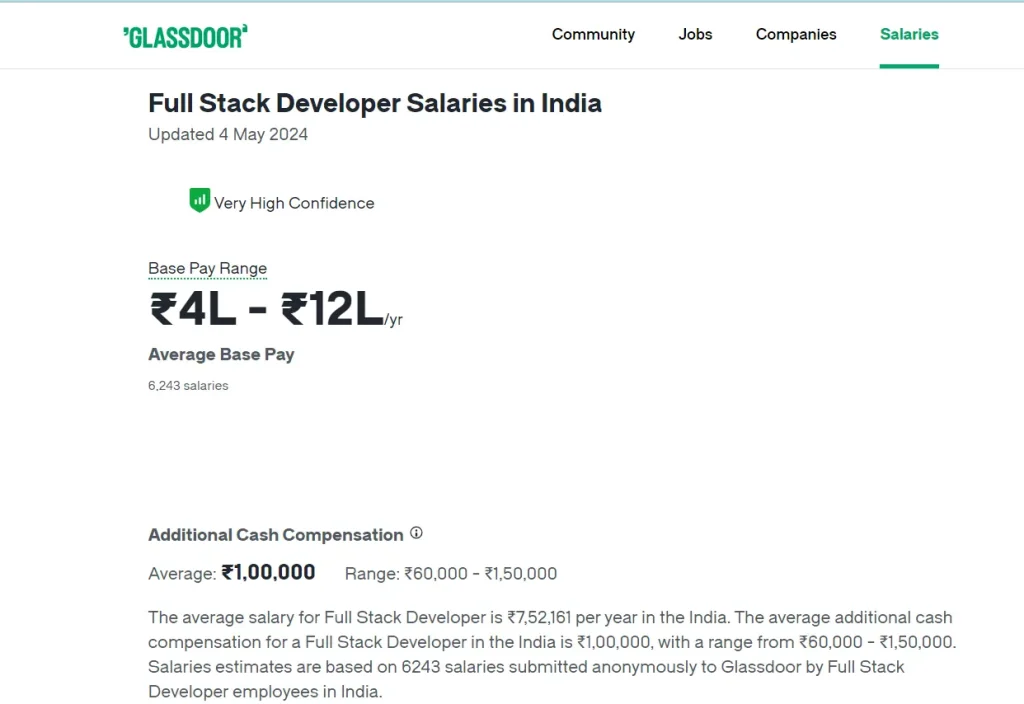
Also Read: Web Development Future (Scope and Trends in 2025 & Beyond)
2. Frontend Developer
Frontend developers design and create the user interface, providing a seamless experience to users. As the emphasis on user-centric and responsive interfaces increases, the demand for frontend developers will also grow.
A frontend developer uses the knowledge of HTML, CSS, and JavaScript to design different elements of a web page and make it appealing and interactive. To make frontend web development as a career, it is important to master different frameworks and libraries, including Vue.JS, Angular, and React. Frontend developers can apply for various job roles, such as web designers, UI/UX designers, and frontend engineers.
Job Responsibilities
- Write clean and efficient code using frontend technologies and languages, such as HTML, CSS, and JS.
- Convert compelling designs into efficient code to offer easy-to-navigate interfaces and memorable user experiences.
- Create appealing and compelling websites.
- Test every aspect of website design to find bugs and fix errors.
- Collaborate with designers, backend developers, and other teams to convert an idea into a reality.
- Ensure a seamless integration between backend and frontend elements.
- Ensure cross-platform compatibility and responsiveness.
Average Salary
According to Glassdoor, the average base salary for a frontend developer is around ₹4-9 LPA. A beginner earns an average salary of ₹3-5 LPA, while a mid-level developer earns ₹4-6 LPA. With experience and expertise in the industry, a senior-level frontend developer handling a team can earn ₹9 LPA or even more.
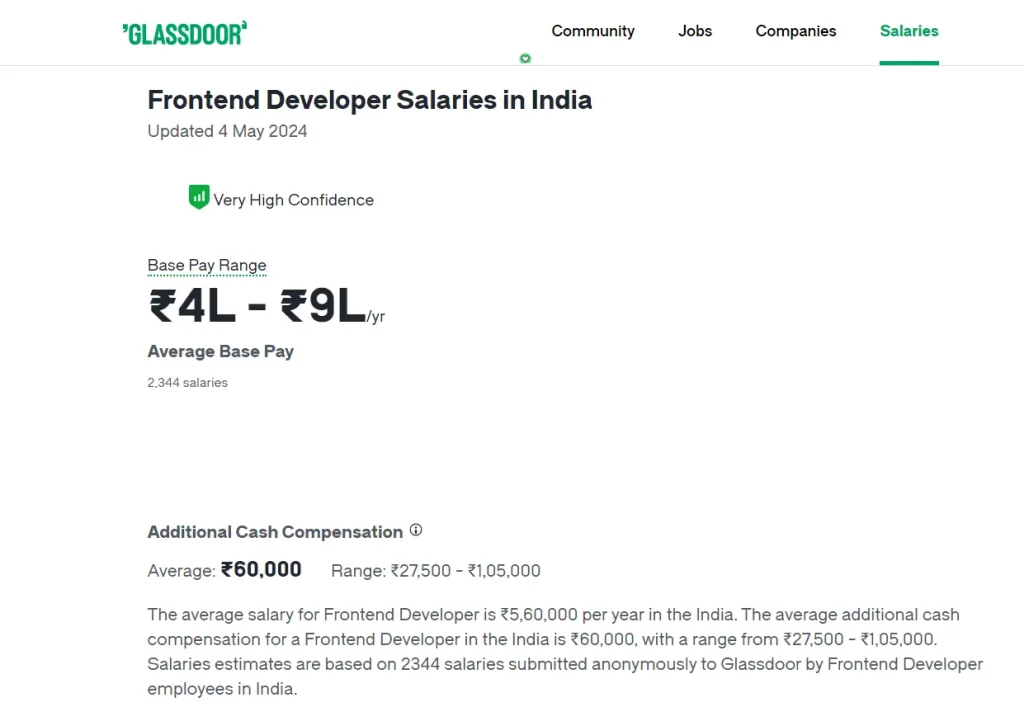
3. Backend Developer
Backend developers deal with the server side of a website or web application. They build and maintain the backend, which involves writing code and ensuring smooth functionality. They work with server scripting, databases, and APIs to store, retrieve, and process data without hassle.
They must have expertise in various backend languages, including Ruby, Python, PHP, Java, Django, etc. Moreover, familiarity with cloud computing platforms, including Azure, AWS, and Google Cloud, is also essential if you want to crack the web development interview and get your dream job.
Backend developers can apply for multiple job roles, such as system architects, web developers, and software engineers.
Job Responsibilities
- Develop and maintain APIs for efficient communication between different frontend and backend elements.
- Focus on server-side logic, maintain data integrity, manage database operations, and optimize server performance.
- Implement necessary security measures to eliminate risks and protect data from any attack.
Average Salary
As reviewed by Glassdoor, the average base pay for a backend developer in India is ₹4-11 LPA. A beginner working as a backend developer earns an average of ₹4-6 LPA, while a mid-level salary package is ₹6-8 LPA. A highly experienced and knowledgeable backend developer can earn an average salary of ₹10-11 LPA or more.
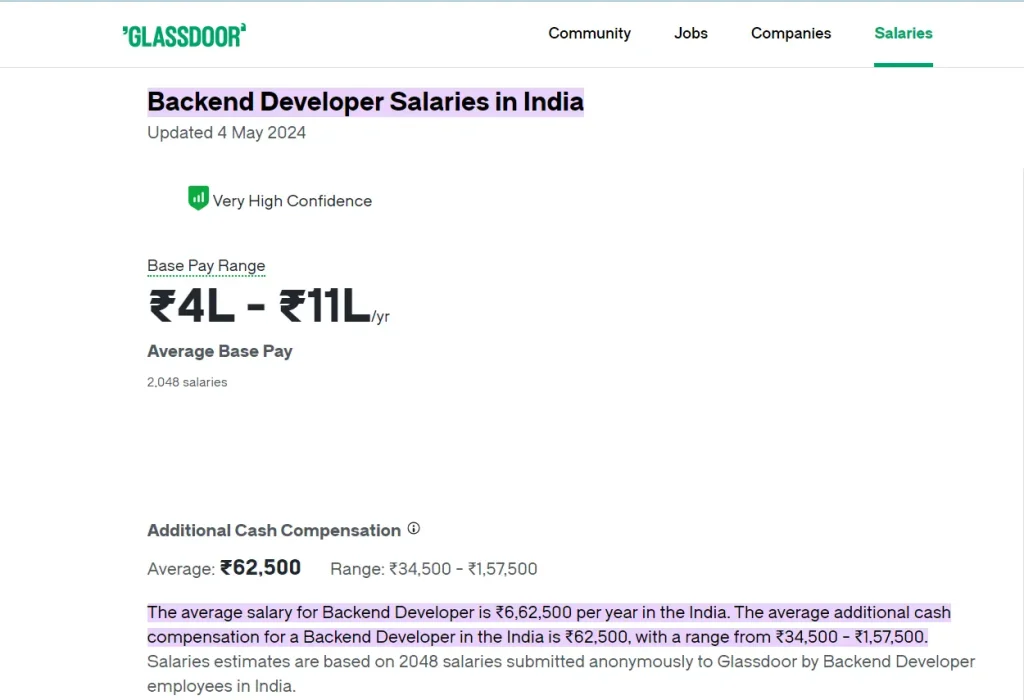
Also Read: How to Learn Web Development? Complete Roadmap 2025
4. Mobile App Developer
The popularity of smartphones and mobile apps doesn’t seem to stop. Hence, there is a rapid increase in the demand for skilled mobile app developers, making app development a lucrative web development career.
Companies need proficient developers to create responsive and engaging apps. Aspirants must gain an understanding of building apps for Android, iOS, Windows, and other operating systems. They must know how to leverage technologies like Flutter, React Native, and Xamarin to build cross-platform applications compatible with multiple devices. They also aim to provide a user-friendly mobile experience to all device users.
Job Responsibilities
- Create full-functional and feature-rich mobile applications.
- Ensuring seamless performance of apps.
- Write clean and readable code.
- Troubleshoot and debug for better performance.
- Keep pace with the latest technologies.
Average Salary
According to Glassdoor, the average base salary of a mobile app developer in India is between ₹4-8 LPA. If you are starting your career, you will make around ₹4 LPA and gradually make ₹5-6 LPA as a mid-level app developer. With extensive experience in the field, you can make more than ₹8 LPA.
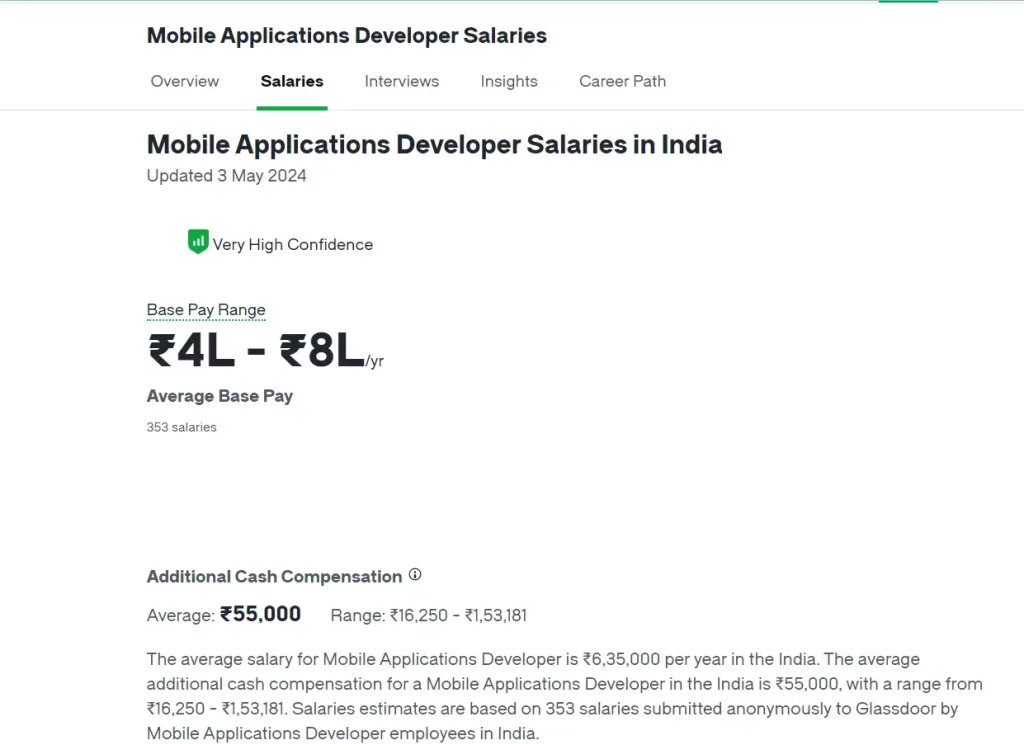
Interview Questions for You to Prepare for Jobs
5. Software Architect
Software architects lead the development team, making informed and major decisions regarding software designs and functionality. They develop high-level concepts and user interface layouts and collaborate with software engineers and architects so the final product meets the business requirements.
They maintain the overall structure of a software system and define technical standards. They analyze the work of designers and developers, assessing that the system is maintainable, scalable, and secure.
Software architects are proficient in software architecture patterns and best practices, which enables them to make valuable suggestions to the development process.
Job Responsibilities
- Be a technical leader, guide the development team, make crucial and informed decisions, and establish coding standards.
- Design the architecture of software by adhering to the best practices to make it highly scalable and reliable.
- Collaborate and interact with stakeholders to understand their expectations and provide solutions that align with their goals.
Average Salary
As reviewed by Glassdoor, the average base pay of a software architect is between ₹23-40 LPA. The job offers highly competitive salary packages and ample growth opportunities. As software engineers gain experience, they can work as software architects and work at a senior-level position as software architects, earning handsome salary packages.
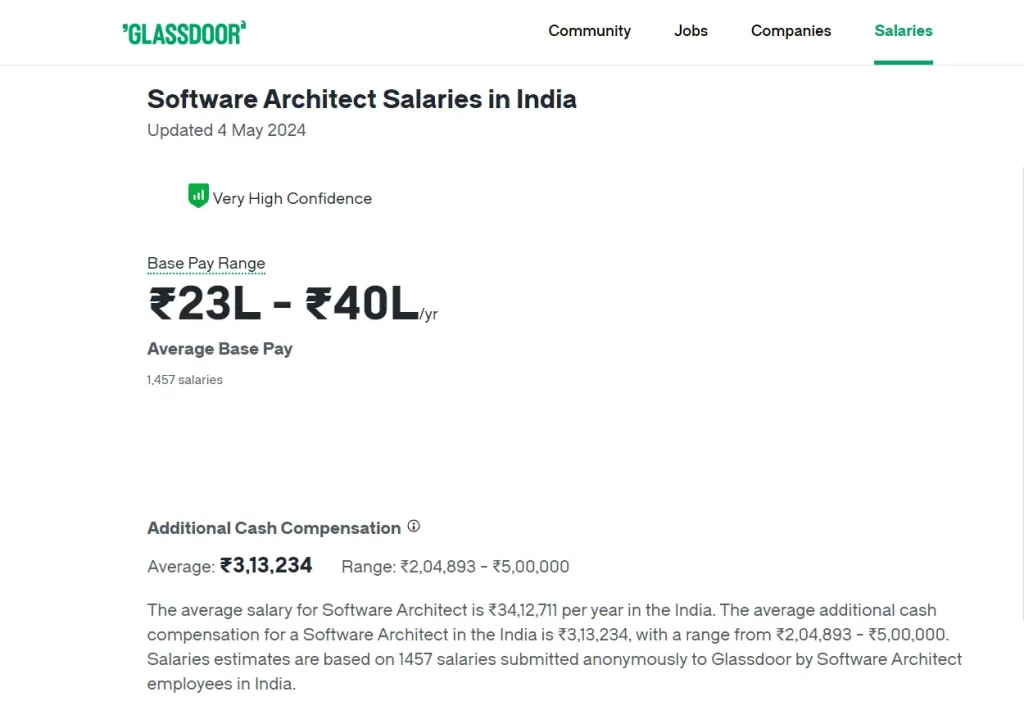
6. UI/UX Designer
User experience (UX) and user interface (UI) web designers work on multiple visual aspects of a website, making it appealing and intuitive. They select the layout, typography, color schemes, and other graphic elements based on the business targets.
As businesses are prioritizing user experience and navigation of a website, web design has become one of the most sought-after web developer career path options. This will increase the demand for web designers who can use advanced tools, such as Figma, Adobe Photoshop, and Sketch, to create exceptional designs according to industry trends and standards.
Designers must also create prototypes and mockups before developers can write code. They should use user research methods and usability principles to come up with unique and innovative ideas.
Job Responsibilities
- Design user interface and related elements for a seamless and engaging navigation experience.
- Create website layouts, select color schemes, and craft other visual and graphic elements.
- Work with developers and programmers to implement design concepts and turn them into fully functional websites.
Average Salary
As assessed by Glassdoor, web designers earn an average base pay of ₹3-7 LPA. UI/UX designers start as graphic designers but gradually apply for senior-level positions as web developers and earn over ₹10 LPA.
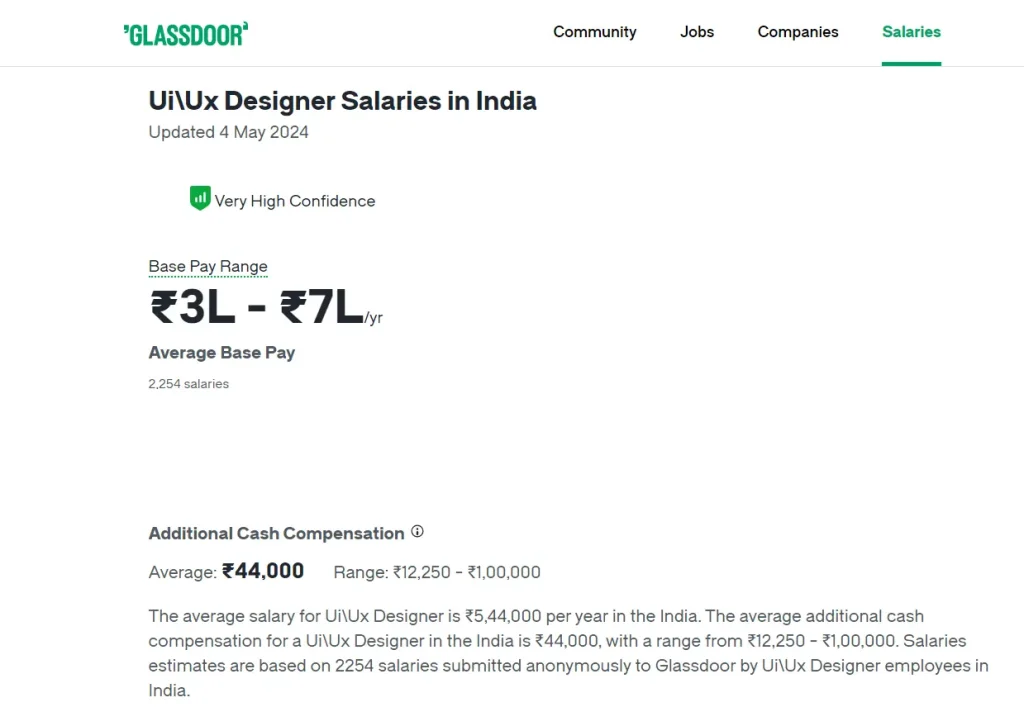
Also Read: 11 Most Popular Web Development Languages (Best in 2025)
7. Cybersecurity Analyst
Companies are now making every effort to secure their data, which is of paramount concern in this digital age. That is where cybersecurity analysts come to the rescue, safeguarding web applications and data against cyber threats.
They find vulnerabilities and loopholes in an app and fix them to mitigate risks. As cyber threats evolve, the need for cybersecurity analysts will also rise.
Job Responsibilities
- Respond to security incidents and concerns by investigating the breaches and implementing corrective measures.
- Assess web applications meticulously to find vulnerabilities and recommend security measures.
- Develop and implement best practices, principles, and policies to protect web applications.
Average Salary
According to Glassdoor, cyber security analysts have an average base pay of ₹4-8 LPA. The job position demands an extensive knowledge of cyber security and ethical hacking. With the right knowledge and industry expertise, you can make over ₹8 LPA.
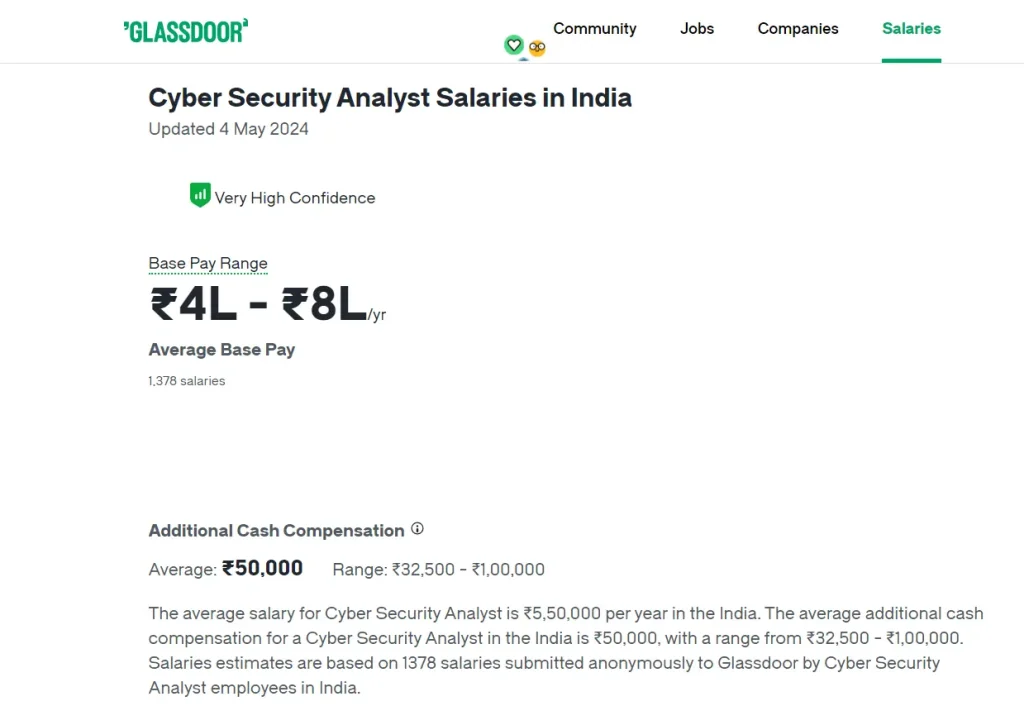
8. Database Administrator
Database administrators, or database managers, are IT professionals who manage all databases, including customer and financial information, of an organization. They update the database according to policies and procedures to avoid data loss or risks.
They are responsible for installing, configuring, monitoring, and enhancing the performance of the database framework. The future of web development career seems bright with database administrator jobs, as it ensures stable and secure opportunities.
You will play a vital role in the company, overseeing operations of the IT infrastructure and safeguarding critical information.
Job Responsibilities
- Create and execute backup and recovery strategies to protect valuable data.
- Manage, optimize, and secure databases used in web development.
- Enhance database performance so that data storage and retrieval is convenient.
- Improve response time for web applications.
Average Salary
As shared by Glassdoor, the average base pay of database administrators is between ₹5-12 LPA. The compensation for entry-level position starts from ₹4-5 LPA.
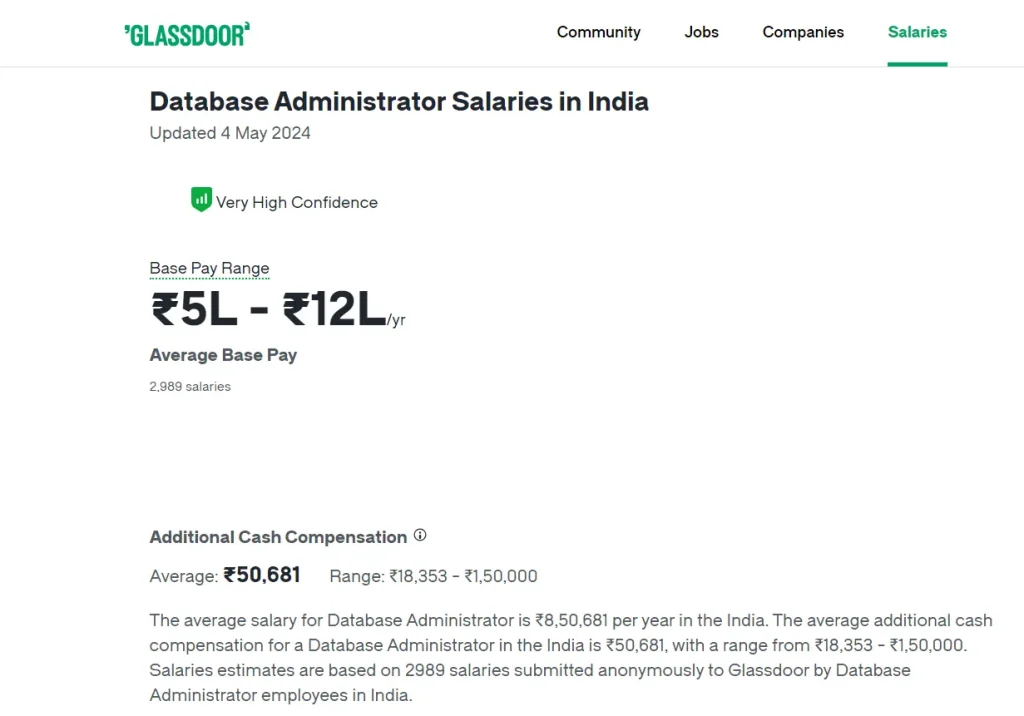

9. Software Engineer
Software engineers design, create, audit, and improve software to meet specific needs. They work as advised by software architects and analysts. They also test the system to diagnose the issues, resolve them, and enhance performance.
This is among the top web development career opportunities, but you need to acquire creativity and technical skills to make the most of it. You will also write clean code using web development languages to ensure efficiency and make recommendations for future development.
One of the significant parts of your job will be to adhere to software engineering principles to solve problems.
Job Responsibilities
- Use frontend and backend technologies to manage end-to-end web development.
- Work with designers, developers, testers, and cross-functional team members to discuss technical aspects.
- Convey important information in simple terms to non-technical stakeholders.
- Contribute to system architecture system, follow the best practices, and ensure scalability.
Average Salary
According to Glassdoor, the average compensation of a software engineer is ₹4-11 LPA. Software engineers start with an average salary of ₹5-7 LPA, but with experience and expertise, they can make over ₹15 LPA applying for senior-level job roles like software architects, team leads, and project managers.
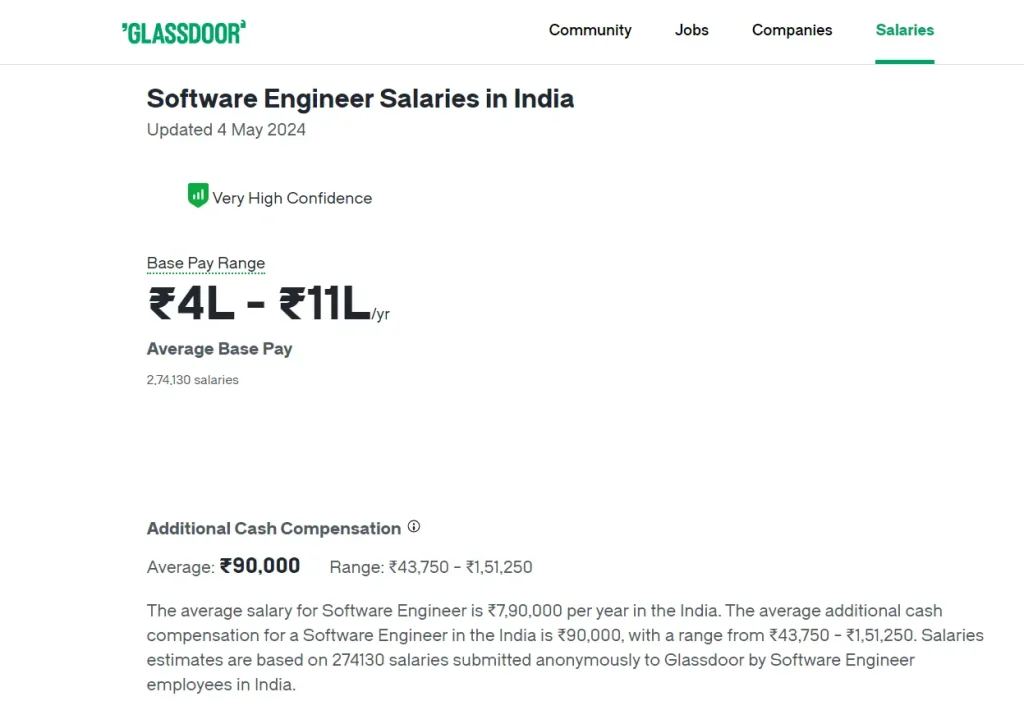
Also Read: Is Web Development a Good Career? 2025 Guide
FAQs Related to Careers in Web Development
Web development career paths come with various benefits, including
– Job flexibility
– Competitive salary packages
– Opportunities for innovation
– Constant learning
– Easy to begin
– High demand for skilled professionals
– Interesting jobs
Web development is a promising career, especially as companies embrace digitization. Businesses want to establish a solid online presence and need talented web developers to build and maintain engaging websites. The industry is known for job stability, competitive salaries, and ample growth opportunities.
You don’t need any specific degree or experience to be a web developer. However, it’s essential to take an online web development course to master programming languages, frameworks, and libraries. Also, familiarize yourself with different tools and technologies used in the field. The next step is to gain hands-on experience and build a strong portfolio. Make sure to stay updated with industry trends and expand your network to find better opportunities.
Web developers hold expertise in various frontend and backend languages, such as HTML, CSS, JavaScript, Python, Java, PHP, Ruby, Angular, MySQL, etc.
Web development offers multiple high-paying jobs and lucrative opportunities, especially for experienced and skilled professionals. You can also work as a freelancer and handle various projects. Your compensation may vary according to location, industry, and experience.
There is no set time limit for becoming an expert in web development. It all depends on your capabilities, consistency, hard work, and dedication. If you take an online web development course and do an internship after that, it will take around 8-10 months to be career-ready.
Before applying for web development job roles, assessing your skills to appear confidently in the interview is essential. The following tips will help you test your skills:
– Hone your skills
– Practice consistently
– Seek guidance from an industry leader
– Build a project
– Connect with other developers
– Join an online community
– Take quizzes and tests
Free Courses for You
Conclusion
The web development sector is one of the most lucrative fields in 2025, with a plethora of career paths and opportunities. Whether it’s coding, designing, testing, or other specializations, if you are serious about making a career in web development, make sure to acquire the necessary skills.
Be consistent in your learning and adapt to industry trends. Also, be open to exploring new avenues within the dynamic industry of web development. Embrace every chance and give your best at every step.
To learn web development, join our full-stack web development course curated by industry professionals and experienced mentors. We also offer hands-on experience through multiple assignments and provide job assistance with top firms.
Read more blogs:



